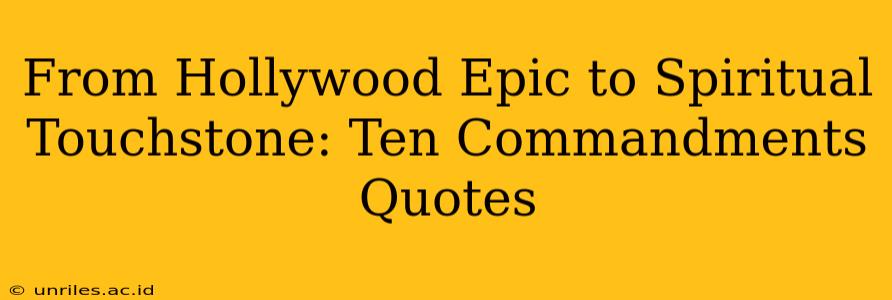Cecil B. DeMille's 1956 epic, The Ten Commandments, remains a cinematic landmark, indelibly etching its biblical narrative into popular culture. Beyond its spectacular visuals and sweeping score, the film's enduring power lies in its potent delivery of the Ten Commandments themselves. These aren't just archaic rules; they resonate with timeless moral and ethical questions, prompting reflection even decades after the film's release. This exploration delves into iconic quotes from the movie, examining their significance within the film's context and their broader relevance to modern life.
"I am the Lord thy God..." - The Beginning of a Covenant
This foundational phrase, spoken majestically by Charlton Heston as Moses, sets the stage for the entire narrative. It's not just a statement; it's the declaration of a covenant, a sacred agreement between God and His people. The weight of this declaration, the visual spectacle accompanying it in DeMille's film, and the implication of divine authority all contribute to its enduring power. It serves as a reminder of the fundamental relationship between humanity and the divine, a theme that transcends religious affiliation.
"Thou shalt have no other gods before me." - The Importance of Monotheism
This commandment underscores the centrality of monotheism in the Judeo-Christian tradition. The film vividly portrays the consequences of idolatry, showing the Israelites' wavering faith and the resulting punishment. This isn't just about religious observance; it speaks to the dangers of misplaced priorities and the potential for corruption when we place our faith in anything other than a higher power, be it material possessions, power, or even other people. In a world often obsessed with materialism, this commandment retains its sharp relevance.
"Thou shalt not make unto thee any graven image..." - Against Idolatry and Materialism
This commandment, closely related to the previous one, elaborates on the dangers of idolatry. The film visually represents the temptation of idols, contrasting the spiritual emptiness they offer with the genuine connection to God. Today, this commandment can be interpreted broadly, addressing the modern temptations of materialism and the worship of superficial values. Are we truly valuing what matters, or are we worshipping idols of our own making?
"Remember the Sabbath day, to keep it holy." - The Value of Rest and Reflection
The commandment to observe the Sabbath encourages rest, reflection, and spiritual renewal. In our relentlessly busy world, this commandment serves as a crucial reminder to prioritize self-care and spiritual growth. The film portrays the Sabbath as a time of community and spiritual rejuvenation, offering a counterpoint to the relentless pursuit of worldly goals. It's a call for balance and a recognition of the importance of disconnecting to reconnect with oneself and something larger.
People Also Ask (PAA) Sections from Google & Bing Searches:
While the exact PAA sections vary depending on the search query and location, frequently asked questions surrounding The Ten Commandments and its quotes generally include:
1. What are the main themes of The Ten Commandments?
The main themes revolve around faith, obedience, justice, redemption, and the consequences of both good and evil choices. The film explores the human struggle with temptation and the importance of adhering to moral principles. It also vividly depicts the power of faith and the rewards of perseverance in the face of adversity.
2. What are the Ten Commandments in order?
- I am the Lord thy God. Thou shalt have no other gods before me.
- Thou shalt not make unto thee any graven image.
- Thou shalt not take the name of the Lord thy God in vain.
- Remember the Sabbath day, to keep it holy.
- Honor thy father and thy mother.
- Thou shalt not kill.
- Thou shalt not commit adultery.
- Thou shalt not steal.
- Thou shalt not bear false witness against thy neighbor.
- Thou shalt not covet thy neighbor's house, thy neighbor's wife, nor his manservant, nor his maidservant, nor his ox, nor his ass, nor any thing that is thy neighbor's.
3. What is the significance of the parting of the Red Sea in The Ten Commandments?
The parting of the Red Sea is a pivotal moment symbolizing God's power and intervention on behalf of His people. It represents divine deliverance from oppression and a powerful display of faith rewarded. The scene itself remains iconic in cinema history, a powerful visual testament to the film's themes.
4. How has The Ten Commandments impacted popular culture?
The Ten Commandments has had a profound and lasting impact on popular culture. Its iconic imagery, memorable quotes, and sweeping score have permeated countless films, television shows, and other media. The film's portrayal of biblical events has shaped the popular understanding of these stories, influencing how they are depicted and interpreted across various platforms.
Conclusion:
The Ten Commandments, both the biblical text and DeMille's cinematic adaptation, remains a potent source of spiritual and moral reflection. The quotes examined here serve not just as memorable lines from a classic film, but as enduring reminders of fundamental ethical principles. They challenge us to consider our own values, priorities, and the choices we make in our daily lives. The film's enduring legacy lies in its ability to translate timeless religious teachings into a visually stunning and powerfully emotive narrative that continues to resonate with audiences today.

